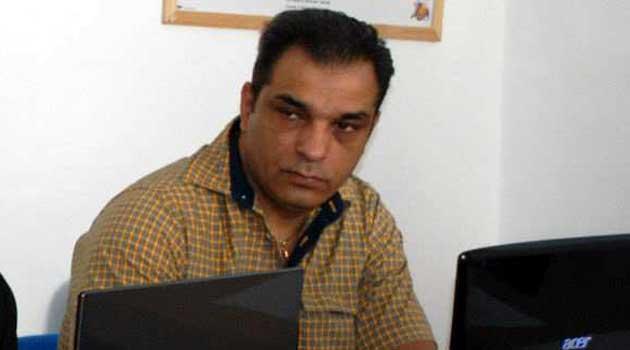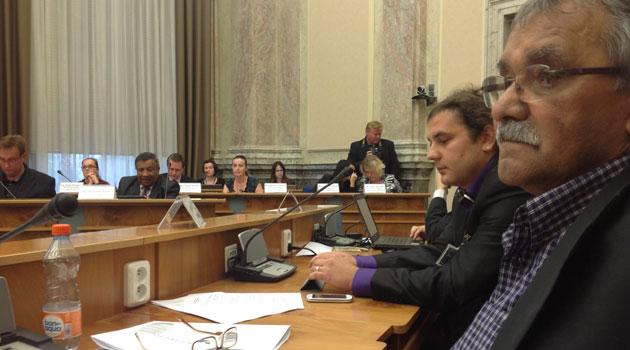Miroslav Kováč on the death of a Romani man in Žatec: Latent institutional racism, lack of respect for human life

In recent days I have been swamped by the various reactions that have contributed different perspectives on the death of the 27-year-old Romani father of two that occurred as a result of the incident at the pizzeria in Žatec under circumstances that have yet to be explained. On that fateful Tuesday evening, Miroslav entered the local pizzeria and caused a stir.
A reaction to him was not long in coming from the customers and staff. They pacified the Romani man and called the local police.
According to several eyewitnesses, some of the customers were still kicking him, in the presence of the police, as he was lying limp on the ground and apparently trying to defend himself against being handcuffed. From the audio recording accompanying the video footage taken by bystanders, it can clearly be heard that Miroslav was still alive during the police intervention.
What happened during the police intervention should be subject to investigation. According to the initial results of the autopsy, evidence of a third party being to blame for his death was not found.
Miroslav did, however, collapse and die. There must be a reason for that.
We should recall that in the Kramný murder case, the initial autopsy failed to find the cause of death (which was eventually proven in that case to have been by electric shock). It is also difficult for some people to estimate the degree of pressure to apply to somebody’s chest when performing resuscitation, especially if bones there have already been broken as a consequence of previous events.
We’ll see what light the next autopsy report sheds on the case. The entire incident was preceded by many events.
For example, somebody used a mobile phone to film Miroslav at the Žatec bus station, where he was probably trying to get home to Louny. At that time there were many other Romani people in the area of the pizzeria, some of whom even filmed the incident inside the pizzeria on their mobile phones – but none of them helped Miroslav, stood up for him, or called his parents to have him picked up.
We Roma already are unable to help each other. That much, at least, we heave learned from our integration: Think of yourself only!
I find another factor in this case to be latent institutional racism, coupled with disrespect for human life and disregard for everyone who does not reach the level of some individuals who are (or who just think they are) “more successful” in society. The power that some individuals acquire becomes a weapon in their hands against those who are less successful and who, from the perspective of the powerful, are “unnecessary” people – but these weapons can even be used against those who have achieved much more success and higher positions in their lives.
Such power is easy to abuse, even during an ordinary police intervention, especially when it is not anticipated that the victim will resist. In the Czech Republic, moreover, Romani people are always considered such second-class citizens.
A substantial part of the “majority” society rejects Romani people. Discrimination and unequal treatment in turn affect them in all key areas of life.
For example, it is curious that in cities with a higher concentration of Romani residents, they are not represented in the ranks of the local police. Double standards for Romani poeple have almost always applied when it has come to their attempting to join such forces.
In the past, Romani applicants to police forces have been notified that they must have a high school diploma, while candidates from the “majority” society managed, up until 1 January 2016, to apply for such jobs with just a certificate of apprenticeship. How many issues, including the death that we are discussing now, might have been avoided, how many Romani people might now be good examples motivating others, if Romani people had been allowed to join local police forces in the past?
A Romani person would not be influenced by prejudice in such a role, out of principle. However, the local authority in Žatec is so influenced by racism that it has even gone as far as to abuse its grant from the Interior Ministry to hire workers who are “majority”-society citizens for its Crime Prevention Assistant project, funding primarily designed especially to bring Romani people to work with the police in the context of community work.
Such a fact already testifies to many things. However, while this case develops, it is necessary to keep a cool head.
Emotions will not aid the rest of us in the Romani community either with solving this case nor with solving this societal problem. If we really want to avoid such problems in the future, we must solve them systematically – and primarily, we must use all of the available democratic means, including the use of our right to vote in favor of people who will be able to promote our interests in the localities, which includes, for example, having Romani representatives among the ranks of the local and state police to eliminate the possibility that cases such as that of the “pizza place” in Žatec will recur.
